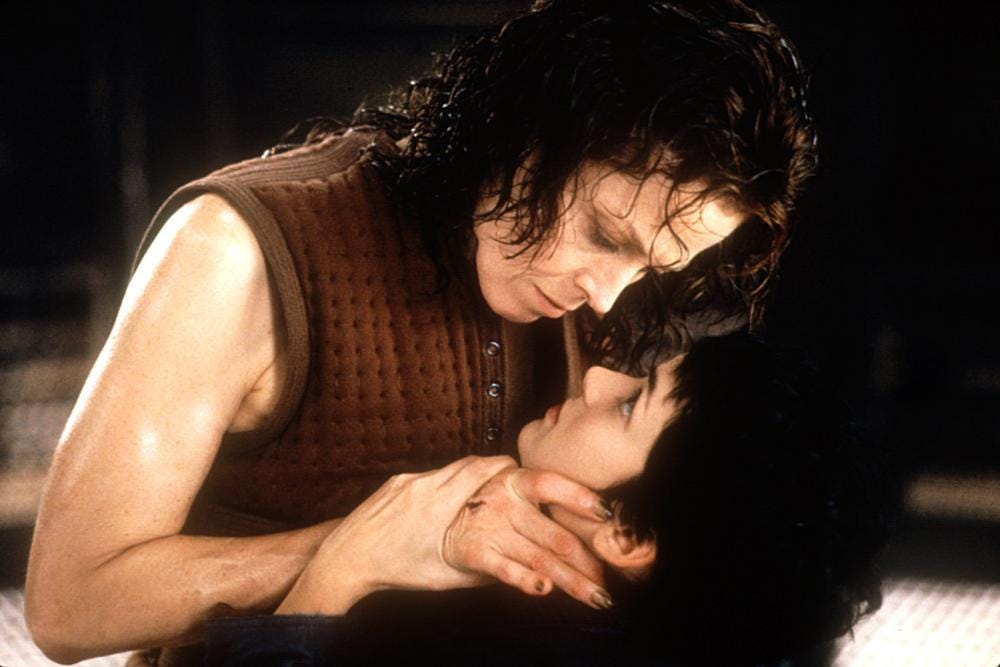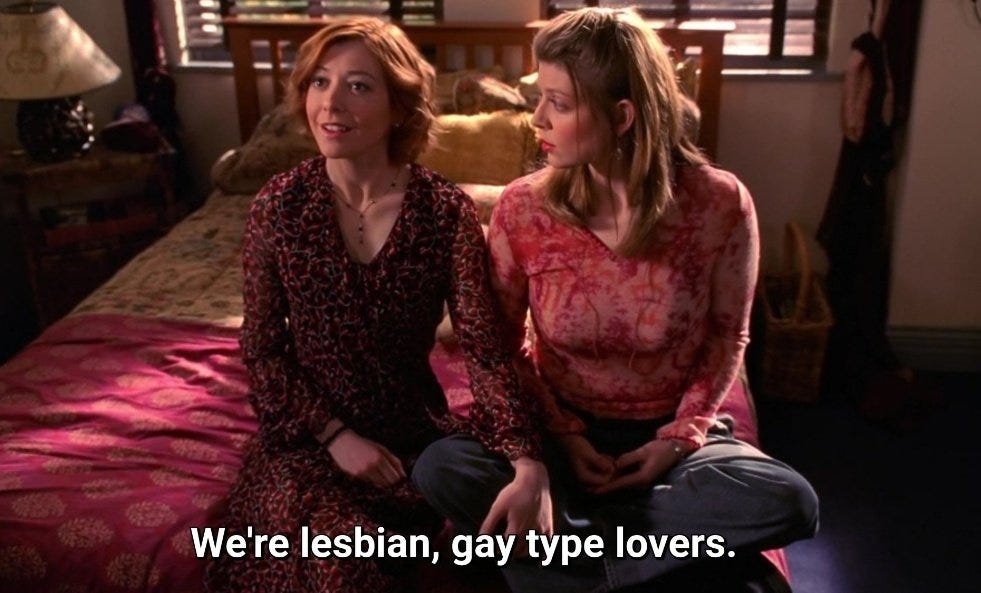Paging Dr. Lesbian - Only Queers Can Defeat Aliens
Only Queers Can Defeat AliensWhat exactly is the Alien franchise trying to tell us about gender and sex?This is the Sunday Edition of Paging Dr. Lesbian. If you like this type of thing, subscribe, and share it with your friends. Upgrade your subscription for more, including weekly dispatches from the lesbian internet, monthly playlists, and a free sticker. Shortly after seeing Alien: Romulus in theaters, I saw a tweet that said “why is the alien from alien always trying to kill butch women.” Distinctions about who is or isn’t butch aside, the amusing comment brings up questions about gender and sexuality that have been present in every iteration of the franchise. Sigourney Weaver’s Ripley has long been figured as a lesbian icon, and the lead character in Romulus, Rain (Cailee Spaeny), is already being read in such a way. Sex and gender have always played into the Alien series in interesting ways, though the messaging deployed therein is far from conclusive. One of the most famous pieces of lore about the first Alien film is that all the characters were written as gender-neutral in the script. A man or a woman could have played Ripley, and the script would remain the same. Indeed, the crew of the Nostromos does function as a fairly genderless group, and the hierarchy isn’t predicated on gender. And yet, hints of patriarchy still abound. When Ripley discovers that the ship’s science officer, Ash (Ian Holm), is a synthetic android tasked with preserving the alien, he tries to suffocate her with a porn magazine. Despite this rather unsubtle attack, Ripley never becomes a sexual object. In the original script, however, the vibe on board the Nostromos was far more sexual. All of the crew members were hooking up with each other, gender notwithstanding. In a conversation with Ripley, Lambert (Veronica Cartwright) notes how odd it is that Ash is the only member of the crew who never propositioned any of them – an early indication that there’s something suspicious about him. There was also going to be a love scene between Ripley and Dallas (Tom Skerritt), but Weaver convinced director Ridley Scott to cut it from the script. As it stands, the world depicted in Alien is a mostly sexless one, where both men and women emerge from cryo sleep in their tighty whities. Instead, the alien is our only depiction of physical penetration. The xenomorph has long been understood as a metaphor for rape and exploitation, particularly of women’s bodies and those of the working class. Sex, as wielded by the xenomorph, is monstrous. That Ripley consistently resists this penetration – and any effort to meld her body with another – is what makes her heroic. She emerges as a queer icon not because of any obvious attraction to women, but because of her visible androgyny, the way she defies binaries of all sorts, and how she embodies physical and mental fortitude. She uses her body purely as a means to survive. The queerest part of James Cameron’s sequel, Aliens, comes in a blink-and-you’ll-miss-it moment of exposition. After being rescued by Weyland–Yutani, Ripley is briefed on the events of Alien, as files of her fellow crew flash up on the screen. If you pause on Lambert’s file, you can see that it says “Subject is Despin Convert at birth (male to female). So far no indication of suppressed traumas related to gender alteration.” This piece of information indicates that Lambert is trans, and presumably intersex as well. It’s an unexpected piece of retcon, and gives us a small glimpse into the medically established ideas about gender and sex in this future universe. Apart from the revelation about Lambert, the gayest character in Aliens is undoubtedly Vasquez, (Jenette Goldstein), a Marine sent to investigate a moon colony. Vasquez is quite butch, and is used to dealing with rude comments about her appearance. When Hudson (Bill Paxton) asks “Hey Vasquez, have you ever been mistaken for a man?” She responds, “No, have you?” Whether she would describe herself as gay or who she sleeps with is irrelevant – especially considering how little human sex and intimacy feature in these films. As far as Ripley goes, she famously becomes a mother figure in Aliens, because if there’s one thing James Cameron loves, it’s a badass mom. At the same time, she’s still the Ripley we’d come to know and love, and the child, Newt (Rebecca Jorden), appears in her life with no biological connection to Ripley nor the involvement of a man. David Fincher’s entry in the franchise, Alien 3, is probably best forgotten about, but we’ll take a brief stopover nonetheless. In this film, the specter of sex is present, as Ripley finds herself trapped on a prison ship populated by killers and rapists, all of whom haven’t seen a woman in years. Though Newt dies in between the two films, Ripley has motherhood forced upon her again, this time in the form of an unwanted xenomorph pregnancy. At the end of the film, she kills herself rather than be the incubator for a xenomorph queen, once again refusing to let her body be used by anyone or anything. Ripley also sports a buzzcut in this movie, which further endeared her to queer folks. In Alien Resurrection, Ripley is not Ripley – she’s Ripley 8, a clone of Ripley mixed with xenomorph DNA. Ripley 8 is more of an idealized woman than the original Ripley. She’s more feminine in appearance, and inexplicably has long, sharp nails. Her energy is more sexual than OG Ripley, perhaps due to the xenomorph’s innate drive to reproduce. We could also read this as a commentary on the normalizing terrors of capitalism and militarism, which have always been the real enemies in the Alien films. At the same time, Alien Resurrection contains by far the queerest dynamic between two characters. Winona Ryder plays Call, a crew member who is later revealed to be a synthetic. Call seems to hate Ripley 8 at first, but the tension transforms into obsession, leading to some charged moments between the two. At one point, Ripley 8 caresses Call’s face, and she later sticks her entire hand into Call’s chest cavity. Such scenes are more erotically charged than any in the series thus far, though, interestingly enough, neither character is entirely human. Ridley Scott’s prequels take the franchise in a different direction, though technically, they reveal the origins of the xenomorph lore. Prometheus gives us the first canonical couple in the series, Shaw (Noomi Rapace) and Holloway (Logan Marshall-Green). We also get the first instance of human sex in the film, which results in Shaw becoming pregnant with an alien baby and Holloway dying. In one of the film’s most brutal scenes, Shaw gives herself a C-section to get the alien baby out of her stomach. There is no such thing as positive childbirth in the Alien universe. In Alien: Covenant, the entire crew is made up of couples, as they are on a mission to colonize a new planet. We get the first canonically gay characters in this film, Lope (Demián Bichir) and Hallett (Nathaniel Dean), though it's unclear how exactly they will help colonizing efforts. We also get a sex scene in Covenant between Ricks (Jussie Smollett) and Upworth (Callie Hernandez), but it is cut short by a xenomorph who snakes in between their legs in the shower. Covenant shows us the first and only indication of android sexuality when David (Michael Fassbender) kisses Walter (also Michael Fassbender), a new android model. We learn in this film that David actually created the xenomorphs – and that he’s horny for himself, apparently – which presumably led to future androids being neutered, in a sense. In most of the series, androids are the embodiment of sexlessness, though David quite literally breaks the mold. That brings us, finally, to Alien: Romulus, Fede Álvarez’ take on the franchise. The film follows three pairs of siblings: Rain (Cailee Spaeny) and her android brother Andy (David Jonsson), Tyler (Archie Renaux) and his sister Kay (Isabela Merced), and Bjorn (Spike Fearn) and his adoptive sister Navarro (Aileen Wu). The group are all trapped on a deadly mining colony that killed their parents, but when they try to escape, they have the misfortune of boarding a ship filled with xenomorphs. Many lesbian and queer viewers have taken a liking to Rain, as she continues in the Alien archetype of badass woman who doesn’t need a man. Tyler is supposedly her ex-boyfriend, but this piece of information barely factors into the film or Rain’s character. Her closest relationship by far is with her android brother, who, in a post-David world, has no selfish or sexual urges to speak of. Romulus also continues the theme of disturbing pregnancy in a manner I won’t spoil here, but suffice it to say you still don’t want to be pregnant in this universe. Unfortunately, Romulus doesn’t add much in the way of novelty to the series. Though it attempts to call back to the first film, it falls more in line with the prequels and their chrome-painted absurdity. What it does carry on is the queer-coded, almost genderless condition of its heroine. Rain’s disinterest in anything but her and Andy’s survival mirrors Ripley’s single-minded purpose, though Rain’s affection for her brother softens her edges considerably. The Alien franchise envisions a society without much sex or intimacy of any kind. This absence heightens the themes of violation as embodied by the xenomorphs, and of exploitation as embodied by capitalism and the military. Within this cold future emerge numerous queer themes, and at least one queer icon. This is not a world we aspire to live in, but a twisted alternative that empowers as much as it terrifies. The Alien films depict queerness without sex. We don’t know what these bodies do, what they are, or what they want. We do know what they can be used for – for exploitation yes, but also for survival against all odds. This kind of refusal is queer, certainly, but it’s also up for interpretation. Both the beauty and the frustration of the franchise is how complicated and contradictory its messaging can be, which leaves plenty of space for viewers to come to their own conclusions. You’re a free subscriber to Paging Dr. Lesbian. For the full experience, which includes weekly dispatches from the lesbian internet, become a paying subscriber. Your support means a lot! |
Older messages
How 'Sapphic Twitter' Became the New Tumblr
Sunday, September 1, 2024
@sapphicslike is leading the charge ͏ ͏ ͏ ͏ ͏ ͏ ͏ ͏ ͏ ͏ ͏ ͏ ͏ ͏ ͏ ͏ ͏ ͏ ͏ ͏ ͏ ͏ ͏ ͏ ͏ ͏ ͏ ͏ ͏ ͏ ͏ ͏ ͏ ͏ ͏ ͏ ͏ ͏ ͏ ͏ ͏ ͏ ͏ ͏ ͏ ͏ ͏ ͏ ͏ ͏ ͏ ͏ ͏ ͏ ͏ ͏ ͏ ͏ ͏ ͏ ͏ ͏ ͏ ͏ ͏ ͏ ͏ ͏ ͏ ͏ ͏ ͏ ͏ ͏ ͏ ͏ ͏ ͏ ͏ ͏ ͏ ͏ ͏
Is Chappell Roan's Lesbian Pop Music Changing The World?
Sunday, August 25, 2024
Sapphic Summer rages on ͏ ͏ ͏ ͏ ͏ ͏ ͏ ͏ ͏ ͏ ͏ ͏ ͏ ͏ ͏ ͏ ͏ ͏ ͏ ͏ ͏ ͏ ͏ ͏ ͏ ͏ ͏ ͏ ͏ ͏ ͏ ͏ ͏ ͏ ͏ ͏ ͏ ͏ ͏ ͏ ͏ ͏ ͏ ͏ ͏ ͏ ͏ ͏ ͏ ͏ ͏ ͏ ͏ ͏ ͏ ͏ ͏ ͏ ͏ ͏ ͏ ͏ ͏ ͏ ͏ ͏ ͏ ͏ ͏ ͏ ͏ ͏ ͏ ͏ ͏ ͏ ͏ ͏ ͏ ͏ ͏ ͏ ͏ ͏ ͏ ͏ ͏ ͏ ͏
Exploring the 'Queer Palestine' Zine
Tuesday, August 20, 2024
On Visibility and Contradiction ͏ ͏ ͏ ͏ ͏ ͏ ͏ ͏ ͏ ͏ ͏ ͏ ͏ ͏ ͏ ͏ ͏ ͏ ͏ ͏ ͏ ͏ ͏ ͏ ͏ ͏ ͏ ͏ ͏ ͏ ͏ ͏ ͏ ͏ ͏ ͏ ͏ ͏ ͏ ͏ ͏ ͏ ͏ ͏ ͏ ͏ ͏ ͏ ͏ ͏ ͏ ͏ ͏ ͏ ͏ ͏ ͏ ͏ ͏ ͏ ͏ ͏ ͏ ͏ ͏ ͏ ͏ ͏ ͏ ͏ ͏ ͏ ͏ ͏ ͏ ͏ ͏ ͏ ͏ ͏ ͏ ͏ ͏ ͏ ͏
Why Sexless Movies Hurt Us All
Sunday, August 11, 2024
Will Steven Spielberg answer for his sins? ͏ ͏ ͏ ͏ ͏ ͏ ͏ ͏ ͏ ͏ ͏ ͏ ͏ ͏ ͏ ͏ ͏ ͏ ͏ ͏ ͏ ͏ ͏ ͏ ͏ ͏ ͏ ͏ ͏ ͏ ͏ ͏ ͏ ͏ ͏ ͏ ͏ ͏ ͏ ͏ ͏ ͏ ͏ ͏ ͏ ͏ ͏ ͏ ͏ ͏ ͏ ͏ ͏ ͏ ͏ ͏ ͏ ͏ ͏ ͏ ͏ ͏ ͏ ͏ ͏ ͏ ͏ ͏ ͏ ͏ ͏ ͏ ͏ ͏ ͏ ͏ ͏ ͏ ͏
Sandy Stone and Susan Stryker Penned a Trans Revolution
Sunday, August 4, 2024
It's time we followed in their footsteps ͏ ͏ ͏ ͏ ͏ ͏ ͏ ͏ ͏ ͏ ͏ ͏ ͏ ͏ ͏ ͏ ͏ ͏ ͏ ͏ ͏ ͏ ͏ ͏ ͏ ͏ ͏ ͏ ͏ ͏ ͏ ͏ ͏ ͏ ͏ ͏ ͏ ͏ ͏ ͏ ͏ ͏ ͏ ͏ ͏ ͏ ͏ ͏ ͏ ͏ ͏ ͏ ͏ ͏ ͏ ͏ ͏ ͏ ͏ ͏ ͏ ͏ ͏ ͏ ͏ ͏ ͏ ͏ ͏ ͏ ͏ ͏ ͏ ͏ ͏ ͏ ͏ ͏
You Might Also Like
There Is Only One Aimee Lou Wood
Monday, March 3, 2025
Today in style, self, culture, and power. The Cut March 3, 2025 ENCOUNTER There Is Only One Aimee Lou Wood A Sex Education fan favorite, she's now breaking into Hollywood on The White Lotus. Get
Kylie's Bedazzled Bra, Doja Cat's Diamond Naked Dress, & Other Oscars Looks
Monday, March 3, 2025
Plus, meet the women choosing petty revenge, your daily horoscope, and more. Mar. 3, 2025 Bustle Daily Rise Above? These Proudly Petty Women Would Rather Fight Back PAYBACK Rise Above? These Proudly
The World’s 50 Best Restaurants is launching a new list
Monday, March 3, 2025
A gunman opened fire into an NYC bar
Solidarity Or Generational Theft?
Monday, March 3, 2025
How should housing folks think about helping seniors stay in their communities? ͏ ͏ ͏ ͏ ͏ ͏ ͏ ͏ ͏ ͏ ͏ ͏ ͏ ͏ ͏ ͏ ͏ ͏ ͏ ͏ ͏ ͏ ͏ ͏ ͏ ͏ ͏ ͏ ͏ ͏ ͏ ͏ ͏ ͏ ͏ ͏ ͏ ͏ ͏ ͏ ͏ ͏ ͏ ͏ ͏ ͏ ͏ ͏ ͏ ͏ ͏ ͏ ͏ ͏ ͏ ͏ ͏ ͏ ͏ ͏ ͏
The Banality of Elon Musk
Monday, March 3, 2025
Or, the world we get when we reward thoughtlessness ͏ ͏ ͏ ͏ ͏ ͏ ͏ ͏ ͏ ͏ ͏ ͏ ͏ ͏ ͏ ͏ ͏ ͏ ͏ ͏ ͏ ͏ ͏ ͏ ͏ ͏ ͏ ͏ ͏ ͏ ͏ ͏ ͏ ͏ ͏ ͏ ͏ ͏ ͏ ͏ ͏ ͏ ͏ ͏ ͏ ͏ ͏ ͏ ͏ ͏ ͏ ͏ ͏ ͏ ͏ ͏ ͏ ͏ ͏ ͏ ͏ ͏ ͏ ͏ ͏ ͏ ͏ ͏ ͏ ͏ ͏ ͏ ͏ ͏ ͏
“In life I’m no longer capable of love,” by Diane Seuss
Monday, March 3, 2025
of that old feeling of being / in love, such a rusty / feeling, ͏ ͏ ͏ ͏ ͏ ͏ ͏ ͏ ͏ ͏ ͏ ͏ ͏ ͏ ͏ ͏ ͏ ͏ ͏ ͏ ͏ ͏ ͏ ͏ ͏ ͏ ͏ ͏ ͏ ͏ ͏ ͏ ͏ ͏ ͏
Your dishwasher isn’t a magician
Monday, March 3, 2025
— Check out what we Skimm'd for you today March 3, 2025 Subscribe Read in browser Together with brad's deals But first: 10 Amazon Prime benefits you may not know about Update location or View
My 10 year anniversary of being single: exclusive extract from my book
Monday, March 3, 2025
Single: Living a Complete Life on Your Own Terms is out now ͏ ͏ ͏ ͏ ͏ ͏ ͏ ͏ ͏ ͏ ͏ ͏ ͏ ͏ ͏ ͏ ͏ ͏ ͏ ͏ ͏ ͏ ͏ ͏ ͏ ͏ ͏ ͏ ͏ ͏ ͏ ͏ ͏ ͏ ͏ ͏ ͏ ͏ ͏ ͏ ͏ ͏ ͏ ͏ ͏ ͏ ͏ ͏ ͏ ͏ ͏ ͏ ͏ ͏ ͏ ͏ ͏ ͏ ͏ ͏ ͏ ͏ ͏ ͏ ͏ ͏ ͏ ͏ ͏ ͏ ͏
Selena Gomez Shut Down The Oscars Red Carpet In This Spectacular Gown
Monday, March 3, 2025
10/10. The Zoe Report Daily The Zoe Report 3.2.2025 Selena Gomez Shut Down The Oscars Red Carpet In A Spectacular Gown (Red Carpet) Selena Gomez Shut Down The Oscars Red Carpet In A Spectacular Gown 10
David Beckham Opens Up About Turning 50, Finally Mastering Pullups, and Feasting on Jellied Eels
Sunday, March 2, 2025
View in Browser Men's Health SHOP MVP EXCLUSIVES SUBSCRIBE THIS WEEK'S MUST-READ David Beckham Opens Up About Turning 50, Finally Mastering Pullups, and Feasting on Jellied Eels David Beckham




